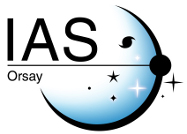Coronal Temperature Maps from Solar EUV Images: A Blind Source Separation Approach
| Titre | Coronal Temperature Maps from Solar EUV Images: A Blind Source Separation Approach |
| Type de publication | Journal Article |
| Year of Publication | 2012 |
| Auteurs | T. de Wit, D, Moussaoui, S, Guennou, C, Auchere, F, Cessateur, G, Kretzschmar, M, Vieira, LA, Goryaev, FF |
| Journal | Solar PhysicsSolar Physics |
| Pagination | 276 |
| Date Published | November 1, 2012 |
| ISBN Number | 0038-0938 |
| Mots-clés | Bayesian inference, Blind source separation, Solar corona, Solar image processing, Ultraviolet spectrum |
| Résumé | Multi-wavelength solar images in the extreme ultraviolet (EUV) are routinely used for analysing solar features such as coronal holes, filaments, and flares. However, images taken in different bands often look remarkably similar, as each band receives contributions coming from regions with a range of different temperatures. This has motivated the search for empirical techniques that may unmix these contributions and concentrate salient morphological features of the corona in a smaller set of less redundant source images. Blind Source Separation (BSS) does precisely this. Here we show how this novel concept also provides new insight into the physics of the solar corona, using observations made by SDO/AIA. The source images are extracted using a Bayesian positive source-separation technique. We show how observations made in six spectral bands, corresponding to optically thin emissions, can be reconstructed by a linear combination of three sources. These sources have a narrower temperature response and allow for considerable data reduction, since the pertinent information from all six bands can be condensed into a single composite picture. In addition, they give access to empirical temperature maps of the corona. The limitations of the BSS technique and some applications are briefly discussed. |



